From November 11 to 18,Chancellor Fan Xianqun of Shanghai Jiao Tong University School of Medicine (SJTUSM), an academician of the Chinese Academy of Engineering, led a delegation to visit Sweden, France, and Germany. During the trip, the delegation visited prominent institutions including the Royal Institute of Technology, Karolinska Institute, French National Eye Hospital, Siemens Healthineers, German Cancer Research Center, and Heidelberg University. Additionally, they visited the Chinese Embassy in Sweden, hosted the 2nd China-France Translational Medicine and Precision Diagnosis Forum, and established the SJTUSM Germany Alumni Association. This visit, as part of SJTUSM’s internationalization strategy, serves to enhance exchanges with broader European partners, laying a solid foundation for expanding student exchanges, talent cultivation, and deepening educational and research cooperation.
First Stop: Sweden
Innovative Collaboration for Practical Cooperation in Talent Development

Sweden, the first Western country to establish diplomatic relations with China, will celebrate the 75th anniversary of Sino-Swedish diplomatic relations next year, with a long history of friendly exchanges between the two countries. During the visit to Sweden,Chancellor Fan Xianqun first met with Chinese Ambassador to Sweden, Cui Aimin, to introduce the cooperation between SJTUSM and Swedish institutions in the field of medicine, expressing a commitment to further promoting Sino-Swedish exchanges in health education. Ambassador Cui highly praised the fruitful results of SJTUSM's cooperation with Swedish medical schools, emphasizing that Sino-Swedish cooperation in health and medical fields has solid foundations and broad prospects. He looked forward to strengthening cooperation between SJTUSM and Swedish medical schools in joint scientific research and technological innovation, thereby enhancing practical cooperation in medical education and contributing more to the wellbeing of humanity.
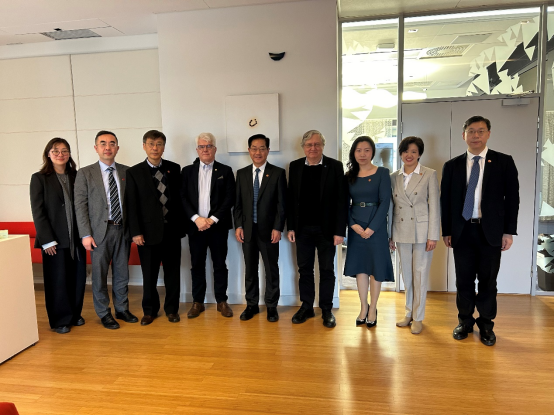
At the Royal Institute of Technology (KTH), Vice President Stefan Östlund welcomed Dean Fan Xianqun and his delegation. Chancellor Fan highlighted KTH’s focus on talent cultivation and research in engineering and technology, noting that KTH is a leader in innovation among European technical universities. He expressed hope that this meeting would serve as a platform for fostering collaboration and promoting interdisciplinary innovation in medicine and engineering. Vice President Östlund agreed, stating that the meeting had deepened mutual understanding, and expressed anticipation for combining KTH’s engineering expertise with SJTUSM’s excellence in medical disciplines to promote high-quality development. Both sides discussed the potential for collaboration in AI and medical research, biomedical engineering, immunology, and medical imaging technologies.
At Karolinska Institute, Vice President Martin Bergö warmly welcomed the delegation.Chancellor Fan reviewed the long-standing cooperation between SJTUSM and Karolinska Institute, noting that Karolinska has been an important partner for SJTUSM. In October, Karolinska’s President Annika Östman Wernerson renewed the memorandum of understanding during her visit to SJTUSM, marking a milestone in strengthening cooperation.Chancellor Fan expressed hope for further collaborative achievements. Vice President Bergö also emphasized Karolinska’s deep appreciation for the partnership with SJTUSM and its commitment to deepening cooperation across multiple dimensions, particularly in the frontiers of medical education and research. The two sides held fruitful discussions on translational medicine research, postdoctoral exchanges, and scientific collaboration.
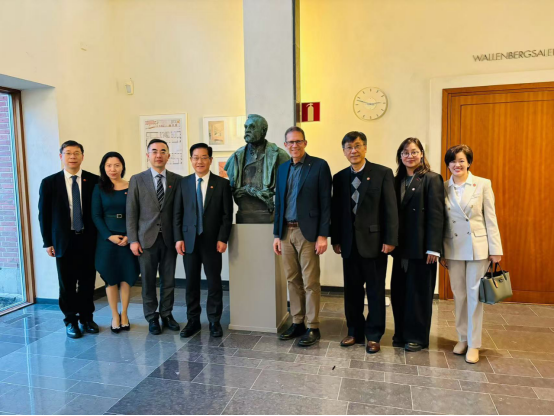
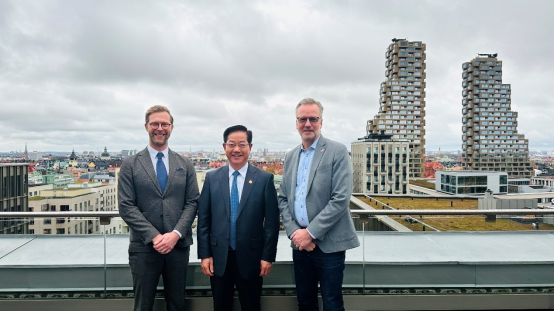
The delegation also visited the Nobel Prize Committee, meeting with Secretary-General Thomas Perlmann, and visited Karolinska University Hospital and St. Erik Eye Hospital. During the same period, the Institute of Immunology’s Director Su Bing, Deputy Director Fang Lijuan, and Professor Ye Lingxiu participated in a seminar exploring cutting-edge topics in immunology.
Second Stop: France
Continuing Friendship, Working Together for Global Medical Education
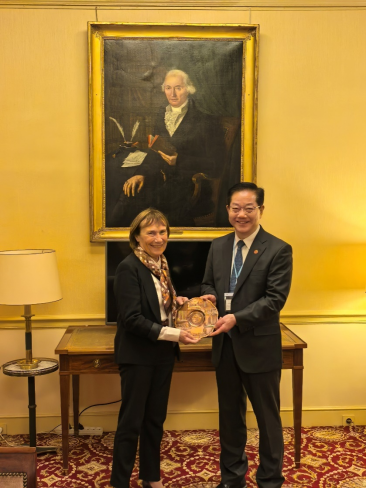
This year marks the 60th anniversary of diplomatic relations between China and France. To further promote international cooperation in translational medicine and precision diagnosis between China and France, the 2nd China-France Translational Medicine and Precision Diagnosis International Forum was held on November 13 at the prestigious French National Academy of Medicine, with a history of over 200 years. The forum was co-hosted by the Chinese Academy of Engineering, Chinese Academy of Medical Sciences, Shanghai Jiao Tong University, and the French National Academy of Medicine, and was organized by SJTUSM and its affiliated Ruijin Hospital. Among the attendees were Chinese Ambassador to France Lu Shaye, Vice President of Chinese Academy of Engineering, President of Chinese Academy of Medical Sciences Wang Chen, and Dean Fan Xianqun. Other notable figures included Academician Chen Saijuan, Chief Scientist at the National Major Science and Technology Infrastructure of Translational Medicine (Shanghai), and Alain Mérieux, President of the Mérieux Foundation.
During the conference, Chen Zhu, Chairman of the Chinese delegation and Vice Chairman of the 13th National People's Congress Standing Committee, delivered a remote speech at the opening ceremony. He said, "The true strength of a horse is known only after a long journey, and true friendship is tested in times of adversity. Over the past 60 years since the establishment of diplomatic relations between China and France, political mutual trust between the two countries has continuously strengthened, and practical cooperation in various fields such as economy, technology, and culture has achieved significant accomplishments, making a great contribution to promoting peace and development worldwide. The exchange and cooperation in fields such as medical education, basic and clinical medicine, public health, the biopharmaceutical industry, and health policy have deepened, yielding fruitful results, and have become an important link connecting the people and academic circles of the two countries."
In his opening speech, Chancellor Fan Xianqun stated that the cooperation between the Shanghai Jiao Tong University School of Medicine and the French medical community has spanned over a century, achieving remarkable results, particularly in the field of medical education. Together, the two sides have successfully built an important platform for cultivating outstanding medical innovation talents. The establishment of the Sino-French Joint Medical School in 2018 marked a new milestone in their cooperation.
The forum covered seven core topics, along with three in-depth roundtable discussions. Experts at the conference engaged in deep exchanges and discussions on subjects including endocrinology exploration, innovations in surgical robotics, research on aging-related diseases, advances in immunology and its treatments, the application of artificial intelligence in health, the mechanisms of neurodevelopment and autism, and the latest developments in infectious diseases. Among them,Chancellor Fan Xianqun, as a representative ofuniversities, shared the successful experience of theClinical Medicine French Programat Shanghai Jiao Tong University School of Medicine during the medical education session. His presentation received widespread praise and high recognition from both Chinese andinternational guests.
During the forum,Chancellor Fan Xianqun represented SJTUSM to renew the cooperation framework agreement with the French National Academy of Medicine. The partnership, which has lasted for 15 years, has led to the establishment of the China-France Life Sciences Master’s Program at SJTUSM and Paris Descartes University (now Paris Cité University) since 2009, with scholarship support provided by the French National Academy of Medicine. In 2017, both sides signed a memorandum of understanding to enhance collaboration in scientific talent development and high-level academic forums. This renewed agreement signals further strengthened cooperation in medical education and research, advancing global medical science.
On the evening of November 13, the French National Academy of Medicine held a special ceremony to officially award Professor Chen Zhu the title of "Honorary Member of the French National Academy of Medicine." Professor Catherine Barthélémy, President of the Academy, presented the certificate and badge to Professor Chen, recognizing his outstanding achievements in the field of medicine and his exceptional contributions to Sino-French cooperation. The French National Academy of Medicine is the highest honor institution in the French medical community, and the requirements for being awarded the title of "Honorary Member" are extremely strict. Currently, there are only six honorary members, including four Nobel Prize laureates. This honor bestowed upon Professor Chen marks the first time in five years that this title has been granted to a foreign scientist. This recognition not only affirms his personal accomplishments but also serves as an important milestone in Sino-French medical cooperation and exchange.
During his visit to France,Chancellor Fan Xianqun was also invited to visit the French National Eye Hospital. He toured various departments, including the outpatient and emergency services, clinical imaging research lab, low vision rehabilitation department, Vision Research Institute, and the Streatlab laboratory.Chancellor Fan had an in-depth discussion with Dr. Christophe Baudouin, the hospital's ophthalmic director, exploring potential collaborative research areas such as gene therapy. They also discussed opportunities for student exchange programs, particularly for clinical internships, with a special focus on collaboration in the field of low vision rehabilitation.
Third Stop: Germany
Steady Development, Shaping the Future
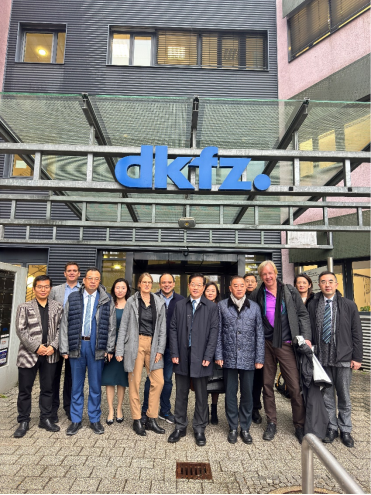
During the visit to Germany, the delegation visited the German Cancer Research Center, where they had discussions with Professor Liu Haikun, Director of the Department of Molecular Neurogenetics.Chancellor Fan Xianqun highlighted that Shanghai Jiao Tong University School of Medicine, as one of China’s top research-oriented medical schools, has long been committed to research in life sciences, including cancer. The German Cancer Research Center, being a world-leading institution in cancer research, presents a unique opportunity for collaboration. The two sides could focus on the frontiers of cancer research, strengthen experience exchange, and share resources. They also discussed conducting full-chain research from clinical problems to basic experiments and clinical applications. Following the discussions, both sides reached a preliminary consensus on deepening scientific research cooperation, enhancing talent development and exchange, and promoting the translation and application of research findings.
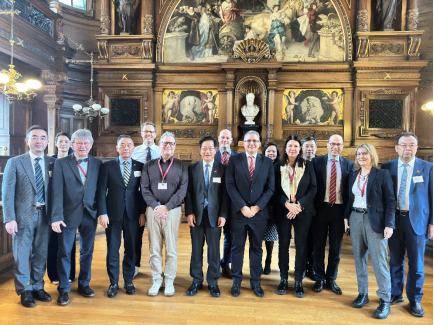
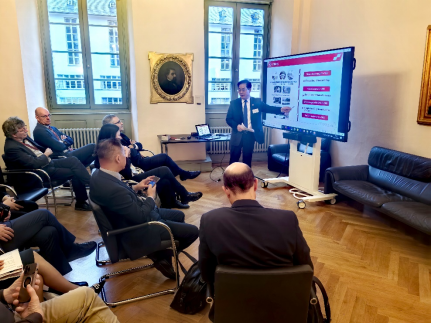
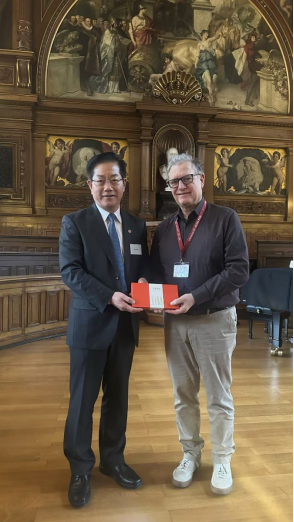
The delegation later visited Heidelberg University, where they were warmly welcomed by Vice Rector Marc-Philippe Weller, Dean of the Heidelberg Medical School Michael Boutros, and Vice Dean of Mannheim Medical School Adelheid Cerwenka.Chancellor Fan Xianqun emphasized that Shanghai Jiao Tong University School of Medicine and Heidelberg University have been running a student exchange program for short-term clinical internships for 12 years. The program is expected to deepen cooperation mechanisms, expand collaborative fields, and elevate the level of cooperation in the future. Both sides engaged in in-depth discussions about joint talent development and interdisciplinary research and expressed their desire to pursue comprehensive collaboration in their respective areas of expertise. The Director of the Heidelberg University Eye Hospital, Gerd U. Auffahrt, also participated in the meeting.
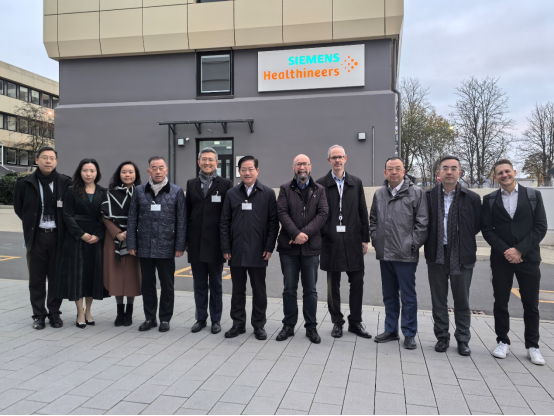
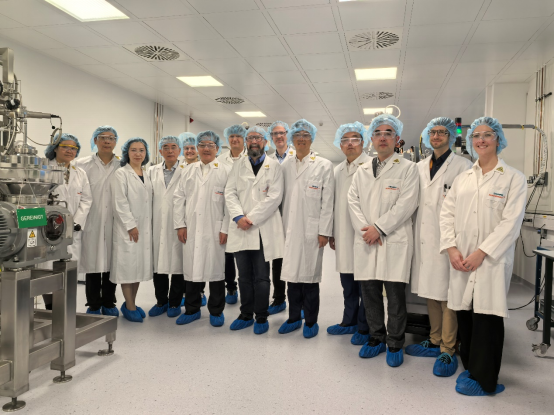
The delegation also visited Siemens Healthineers, where they met with Vice President Claus Pruemper and the Head of Siemens Healthineers China, Wang Haofeng. They toured the supply chain, manufacturing workshop, and R&D laboratories to gain insights into the core areas of medical diagnostics. Both sides expressed their intention to focus on addressing significant demands in the healthcare sector through joint technological innovation, strengthening scientific research cooperation and research transformation, and promoting the integration of industry, academia, and research. Together, they aim to drive innovation and the application of healthcare technologies, injecting new vitality into the progress and development of the healthcare industry.
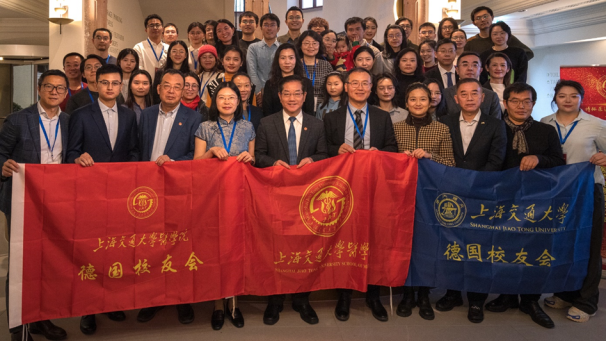
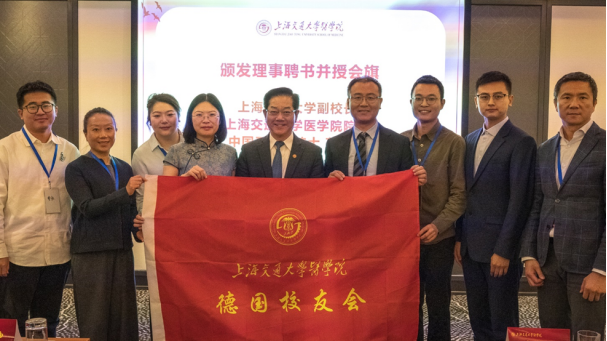
During the delegation's visit to Germany, the inauguration ceremony of Shanghai Jiao Tong University School of Medicine Alumni Association and the Shanghai Jiao Tong University Germany Alumni Association Medical Division was held.Chancellor Fan Xianqun and the delegation, along with more than fifty alumni living and working in Germany, jointly witnessed the establishment of the medical alumni organization in Germany.
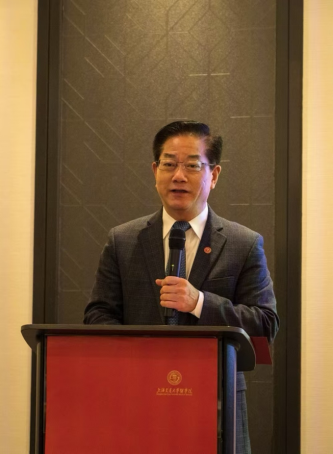
In his speech,Chancellor Fan Xianqun warmly welcomed the alumni and guests in attendance and conveyed his greetings to all the alumni in Germany on behalf of the faculty, staff, and students of the Shanghai Jiao Tong University School of Medicine. He emphasized the important role the establishment of the Shanghai Jiao Tong University School of Medicine Germany Alumni Association would play in strengthening connections among alumni in Germany, uniting their efforts, and promoting their growth.
Dean Fan reviewed the history and achievements ofSJTUSM, noting that Shanghai Jiao Tong University School of Medicine is an institution that embraces diversity and excellence, one that stands at the forefront of innovation, and one that values both tradition and progress. He acknowledged the accomplishments of the alumni in Germany and expressed his appreciation for their contributions.
He also presented three hopes for the alumni association:1)To strengthen communication and connection among alumni, expanding the alumni network.2)To unite alumni and build a platform for mutual exchange and support.3)To serve as a bridge for friendship and promote international collaboration in medical fields at the alma mater.
ChancellorFan thanked the alumni who had worked hard to establish the association and invited them to frequently return to their alma mater to share their insights and contribute to the development of the university.
The first president of the alumni association, Yun Haiyang, delivered a speech expressing his thoughts. He stated that the Germany Alumni Association would always adhere to the motto and spirit of SJTUSM. He emphasized that the association would unite and bring together alumni, striving to establish a vibrant and creative alumni network. This network would serve as a wide platform for alumni to share experiences and strengthen friendships.
This visit involved in-depth dialogues with top medical institutions and organizations in Sweden, France, and Germany, resulting in several agreements on expanding cooperation and promoting collaborative innovation. It marks a significant step forward for Shanghai Jiao Tong University School of Medicine in further advancing its international cooperation network. The delegation included representatives from the Chancellor’s Office, Office of Academic Planning and Development, Office of International Affairs, Office of Development andLiason, Sino-French Joint Medical School, Institute of Immunology, as well as affiliated hospitals such as Ruijin Hospital and Renji Hospital.
The visit to the Royal Institute of Technology (KTH) in Sweden, the largest and oldest technical university in the country, highlighted its strong research reputation, solidifying its position as one of Europe's most prestigious technical universities. The Karolinska Institute, ranked among the top ten medical schools in the world, accounts for 43% of Sweden's national academic research in medicine and hosts the renowned Karolinska University Hospital. It is globally known for its Nobel Committee, which annually reviews and awards the Nobel Prize in Physiology or Medicine.
The National Ophthalmology Hospital in France, the largest ophthalmic hospital in Europe, is equipped with the most advanced ophthalmic medical devices and houses the world’s largest and most cutting-edge visual research center. The German Cancer Research Center (DKFZ), the largest biomedical research institution in Germany, has a long-term goal of finding new methods for the diagnosis, treatment, and prevention of cancer.
Heidelberg University, one of Germany's and the world's leading research universities, holds a top position in several fields, especially in medicine, life sciences, natural sciences, and humanities. Siemens Healthineers, a global leader in medical technology, is also a dominant force in the laboratory diagnostics sector.
This visit has greatly enhanced the friendly relations between Shanghai Jiao Tong University School of Medicine and top European universities and global leading research institutions. It has advanced the university’s international strategy, expanding cooperation into deeper and broader areas, injecting strong momentum into the construction of first-class disciplines and the deepening of Sino-European collaborations.

